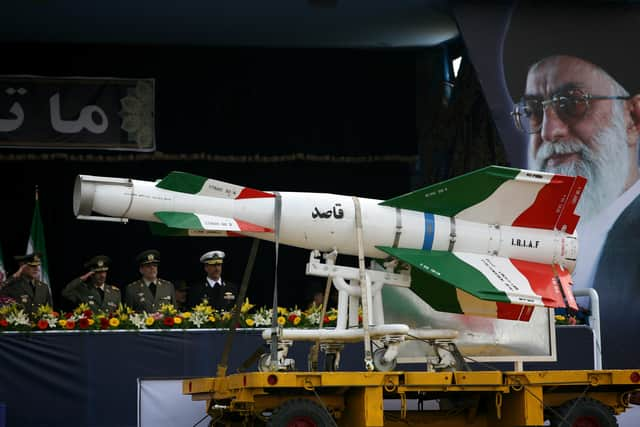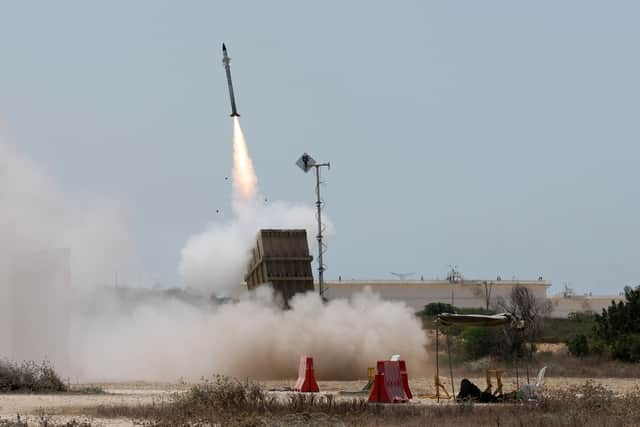Does Iran have nuclear weapons? Has Israel got nuclear weapons, do they reach UK - which countries have them?
and live on Freeview channel 276
In order to avoid escalating the conflict with Iran, Lord David Cameron has urged Israel to be "smart as well as tough."
The Foreign Secretary stated that Israel should regard Tehran's attack as an “almost total failure” and approach its response by thinking “with head as well as heart”.
Advertisement
Hide AdAdvertisement
Hide AdHe confirmed that British RAF aircraft shot down "a small number" of drones fired by Iran in what was its first overt military attack on Israeli territory.
The unprecedented attack by Iran, which it said was in retaliation against a strike on an Iranian diplomatic compound in Syria earlier this month, has raised fears over the Israel-Hamas war spiralling into a wider regional conflagration.
He described it as a “double defeat” for Tehran, with its attack being not only “an almost total failure, but also the rest of the world can now see what a malign influence they are in the region”.
“Had those weapons not been shot down, there could have been thousands of casualties, including civilian casualties,” he told Sky News, describing Tehran’s actions as “reckless and dangerous”.
Advertisement
Hide AdAdvertisement
Hide AdRAF jets could defend Israel again, even if the country’s leaders ignored calls from the UK and US to hold back from retaliation against Iran, Lord Cameron suggested.
Leaders of the G7 on Sunday (14 April) warned an “uncontrollable regional escalation” in the Middle East must be prevented and said they “stand ready to take further measures now and in response to further destabilising initiatives”.
All eyes will be on the response from Israel’s Prime Minister Benjamin Netanyahu’s government, with countries in the region and elsewhere urging restraint to avoid intensifying the conflict.
Like Russia’s full scale invasion of Ukraine in 2022, events have once again raised the prospect of a potential, global conflict. In modern times, that in turn leads to one conclusion: could we see an outbreak of nuclear warfare?
Advertisement
Hide AdAdvertisement
Hide AdDo Iran and Israel possess a nuclear arsenal, and could any armaments reach us here in the UK? Here is everything you need to know.


Which countries have nuclear weapons?
Nuclear weapons have been a source of both fascination and fear since their inception. The possession of such destructive power by nations around the world has prompted significant efforts to regulate and limit their proliferation through treaties and agreements.
The journey towards nuclear disarmament and non-proliferation began in earnest after the devastation of World War II, with the realisation of the catastrophic potential of nuclear weapons.
The cornerstone treaty in this regard is the Treaty on the Non-Proliferation of Nuclear Weapons (NPT), which was opened for signature in 1968 and entered into force in 1970.
Advertisement
Hide AdAdvertisement
Hide AdThe NPT aims to prevent the spread of nuclear weapons and promote disarmament while allowing signatory nations access to peaceful nuclear technology.
Under the NPT, five countries are recognized as nuclear-weapon states: the United States, Russia, China, France, and the United Kingdom.
These states are permitted to possess nuclear weapons under the treaty, although they are obligated to work towards disarmament.
Non-nuclear-weapon states, in turn, commit not to acquire nuclear weapons and agree to submit to international inspections of their nuclear facilities to verify compliance.
Advertisement
Hide AdAdvertisement
Hide AdBut despite the NPT's efforts, some nations have pursued nuclear weapons outside of its framework. North Korea famously withdrew from the treaty in 2003 and continues to conduct nuclear tests, and its nuclear program remains a significant concern for global security.
As of recent assessments, nine countries are known to possess nuclear weapons: the United States, Russia, China, France, the United Kingdom, Pakistan, India, Israel, and North Korea.


Does Israel have nuclear weapons?
Israel, unlike the other known nuclear-armed states, has neither confirmed nor denied possessing nuclear weapons, but it is widely believed to have a significant nuclear arsenal.
Israel has maintained a policy of ambiguity regarding its nuclear capabilities, neither confirming nor denying their existence.
Advertisement
Hide AdAdvertisement
Hide AdThis deliberate ambiguity, often referred to as "nuclear opacity," has been a cornerstone of Israel's nuclear posture since the inception of its nuclear program, and has allowed Israel to deter potential adversaries while avoiding international scrutiny and condemnation.
But over the years, there have been numerous reports, leaks and assessments from intelligence agencies, experts and whistleblowers indicating Israel's possession of nuclear weapons, including satellite imagery of suspected nuclear facilities, testimonies from former Israeli officials and disclosures from foreign intelligence services.
Israel possesses advanced scientific and technological capabilities, including a well-developed defence industry and expertise in nuclear-related fields such as physics and engineering.
Advertisement
Hide AdAdvertisement
Hide AdThese capabilities provide Israel with the technical know-how necessary for developing and maintaining nuclear weapons.
Does Iran have nuclear weapons?
While Iran has consistently maintained that its nuclear activities are for peaceful purposes, such as electricity generation and medical research, and asserts its right to develop nuclear technology for civilian use under the NPT, concerns have been raised about the potential for weaponisation.
The controversy surrounding Iran's nuclear program stems from suspicions among some countries and international organisations that Iran may be seeking to develop nuclear weapons despite its assurances of peaceful intentions, suspicions that have led to efforts to curb Iran's nuclear activities through negotiations and agreements.
The Joint Comprehensive Plan of Action (JCPOA), commonly known as the Iran nuclear deal, was signed in 2015 to address these concerns by imposing restrictions on Iran's nuclear activities in exchange for sanctions relief.
Advertisement
Hide AdAdvertisement
Hide AdUnder the JCPOA, Iran agreed to significantly reduce its stockpile of enriched uranium, dismantle a substantial portion of its centrifuges used for uranium enrichment, and allow extensive inspections of its nuclear facilities by the International Atomic Energy Agency (IAEA).
In return, the P5+1 countries (the United States, United Kingdom, France, Russia, China, and Germany) and the European Union agreed to lift nuclear-related economic sanctions imposed on Iran, allowing the country to rejoin the global economy and benefit from increased trade and investment opportunities.
But in 2018, under the leadership of then president Donald Trump, the US withdrew from the agreement, leading to tensions escalating and renewed concerns about Iran's nuclear ambitions.
Following the US withdrawal from the JCPOA, Iran announced a phased reduction of its compliance with the agreement's provisions, citing the failure of other signatories to uphold their end of the bargain due to the reimposition of sanctions.
Advertisement
Hide AdAdvertisement
Hide AdCould Iranian weapons reach the UK?
Iran is situated approximately 2,000 miles (3,200 kilometres) away from the UK, making direct missile strikes challenging but not impossible, and its ballistic missile program has progressed significantly in recent years, with the development of medium and intermediate-range missiles.
Iran possesses a variety of ballistic missiles, including the Shahab series and the Sejjil missile, with ranges that could theoretically reach parts of Europe, including the UK.
But its ballistic missile technology is still evolving, and uncertainties remain regarding the accuracy and reliability of its long-range missiles.
There isn't a precise number of missiles publicly available for the size of Iran's arsenal due to the secretive nature of its military programs and the lack of transparency regarding its inventory.
Advertisement
Hide AdAdvertisement
Hide AdVarious sources, including military analysts, intelligence agencies and government reports, may provide estimates or assessments of Iran's missile stockpiles, but these figures can vary widely and may not always be accurate.
Comment Guidelines
National World encourages reader discussion on our stories. User feedback, insights and back-and-forth exchanges add a rich layer of context to reporting. Please review our Community Guidelines before commenting.
